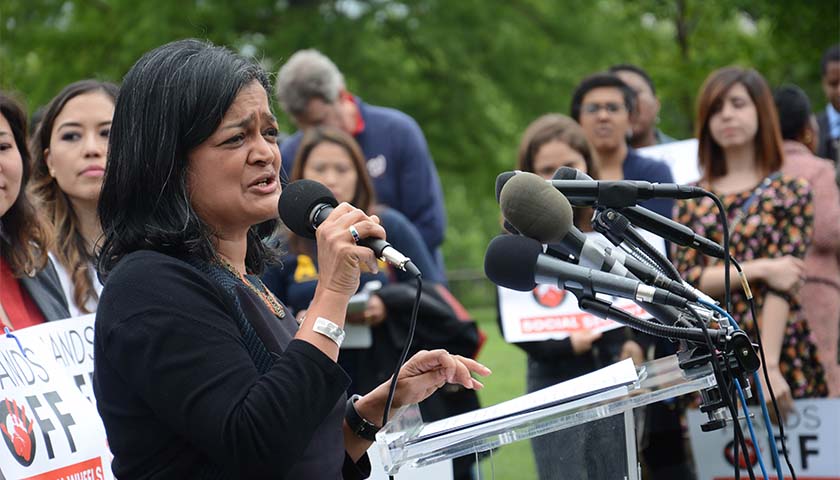by Ellie Gardey
For three months, as the chair of the Congressional Progressive Caucus, Rep. Pramila Jayapal was firm in her threat: “We will agree to the bipartisan [infrastructure] bill if, and only if, we also pass the reconciliation bill first.” She was the driving force and the public face behind progressives’ mission to use the infrastructure bill as a cudgel to force Sen. Joe Manchin, Sen. Kyrsten Sinema, and other centrist Democrats into passing Build Back Better. She repeatedly appeared on “The Rachel Maddow Show” to give attention to her strongarm tactics.
Time and time again in August, September, and October, Speaker of the House Nancy Pelosi was forced to back down from votes on infrastructure because of Jayapal. When a reporter told Jayapal that some people believed she was “bluffing,” Jayapal, who has nearly 100 members in her caucus, said, “Try us.”
But they tried her enough, and Jayapal blinked. On November 1, she announced that she and her caucus would vote for the infrastructure bill even though Sen. Joe Manchin had not given his assurance that he would vote for the $1.75 trillion Build Back Better bill. Jayapal explained that she believed President Joe Biden when he said he would get Manchin on board. “The president says he can get 51 votes for the bill,” she said. “We are going to trust him.… We’re tired of continuing to wait for one or two people.”
That same day, Manchin continued to voice his concerns with Build Back Better. Speaking on Capitol Hill, he said, “Throughout the last three months I have been straightforward about my concerns, that I will not support a reconciliation package that expands social programs and irresponsibly adds to our $29 trillion in national debt that no one seems to really care about.”
Jayapal told her caucus at a meeting on November 5 that they had taken their standstill as far as they could. Biden called into the meeting and asked Democrats to trust him that he had Manchin’s commitment to passing Build Back Better. Five progressives disagreed with Jayapal’s decision to relent: Jamaal Bowman, Cori Bush, Alexandria Ocasio-Cortez, Ilhan Omar, and Rashida Tlaib. “This is bulls–t,” said Ocasio-Cortez. Yet, enough of Jayapal’s caucus sided with her, and the bill was passed.
It was an epic disaster. The progressives had created high expectations that they would use their leverage on infrastructure to pass all of Build Back Better, and they had failed to deliver. When the infrastructure bill passed the House on November 5, a Friday night, it felt like defeat.
The infrastructure bill also seemed to be too little, too late. Just days earlier, Republican Glenn Youngkin had soundly defeated Democrat Terry McAuliffe in the Virginia gubernatorial election. Many Democrats placed the blame for that squarely on Jayapal and her progressive colleagues. They believed that had they scored a major legislative victory before the election, the state would not have turned red. That was certainly the opinion of Virginia Sens. Mark Warner and Tim Kaine.
Kaine said on CBS News, “I think congressional Democrats blew the timing. We should’ve passed these bills in early October. If we had, it would’ve helped Terry McAuliffe probably win the governor’s race.” For his part, Warner said that McAuliffe would have “absolutely” won had he been able to run on an infrastructure victory.
Following McAuliffe’s loss, passing the infrastructure bill seemed like a surrender and a recognition that progressives’ standoff had dealt the Democrats the lethal blow in Virginia.
Jayapal’s deadlock has now been rendered entirely pointless because Manchin has said he “cannot vote” for Build Back Better. He explained on “Fox News Sunday” that he had done “everything humanly possible,” to reach a compromise. While Democrats have some hope of rewriting the bill to Manchin’s liking, the road to passage seems steeper than ever.
The stunt orchestrated and executed by Jayapal wasn’t just pointless, however. In her three-month standstill, Biden’s approval ratings continued to dive, the Democrats appeared incapable of governing, and Virginia flipped to the Republicans. And because passing infrastructure felt like defeat and surrender, Democrats have gained little from it. In fact, Biden saw no increase in his approval rating after the House passed infrastructure or after he signed it into law.
It turns out that Jayapal’s master plan, which endeared her to progressives at the time, was a disaster of epic proportions for the Democrats. If she had simply passed infrastructure after the Senate passed it, Democrats would have avoided her ridiculous charade that dragged on for months while dragging the party name.
In a series of interviews this week, Jayapal took no responsibility for the embarrassment she created for her party. She instead took character shots at Manchin and claimed that he had backed down from his word.
In a statement, she said he had “betrayed his commitment not only to the President and Democrats in Congress but most importantly, to the American people.” She also told reporters of Manchin: “That lack of integrity is stunning.” (She did not mention that 14 former staff members accused her in September of mistreating the people who work for her.)
Jayapal still tried to pretend Wednesday that her standoff was useful: “I think it got [Manchin] committed, to the president, to the framework. That only happened because the [Congressional Progressive Caucus] held the line. I believe he was looking for a way to get out of it.”
If she sounds like a bitter loser, that’s because she is one. She wasted months of Congress’s time and then caved, leaving Democrats with a terrible legislative record and low public support going into the midterms.
Manchin had warned: “Holding this bill hostage is not going to work in getting my support for this reconciliation bill.” But Jayapal didn’t listen, and she’s paying the price.
– – –
Ellie Gardey is reporter and assistant editor at The American Spectator. Follow her on Twitter @EllieGardey.
Photo “Pramila Jayapal” by AFGE. CC BY 2.0.





